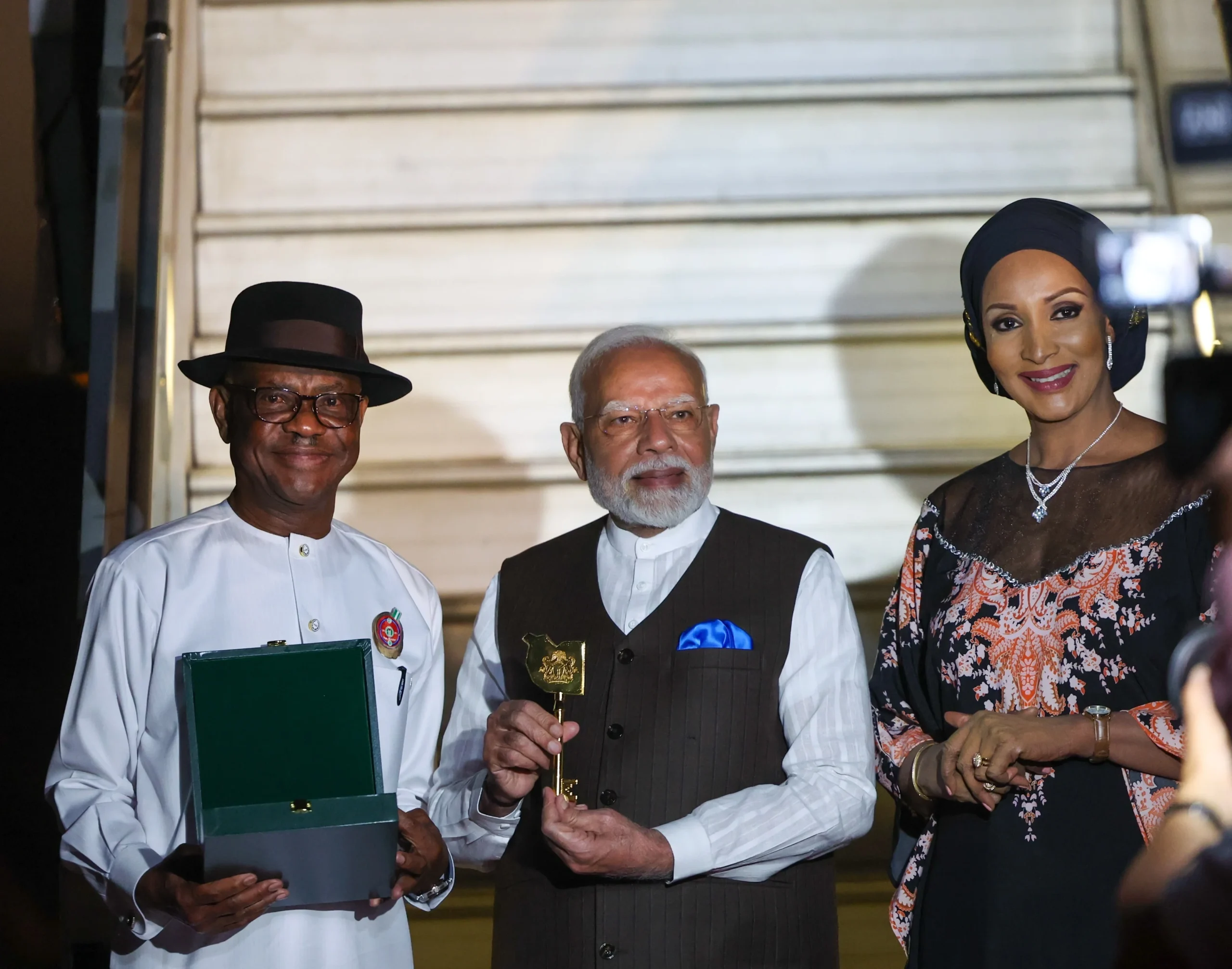Introduction
- India and Nigeria, two vibrant democracies with diverse cultures and growing economies, have enjoyed a robust partnership that spans over six decades.
- Prime Minister Narendra Modi’s recent visit to Nigeria, the first by an Indian Prime Minister in 17 years, has reignited focus on this important bilateral relationship.
- The visit underlined the shared commitment of both nations to collaborate across various domains, including defense, technology, health, and education. Notably, India provided 20 tons of humanitarian aid for Nigerian flood victims, and PM Modi was honored with Nigeria’s prestigious national award, the Grand Commander of the Order of the Niger.

A Historical Perspective
- India and Nigeria have a long-standing relationship based on mutual respect and shared values. Both countries, as leading democracies with multicultural and multilingual societies, have naturally aligned interests.
- Diplomatic Beginnings: India opened its first diplomatic mission in Nigeria in 1958, two years before Nigeria gained independence from British rule.
- Strategic Milestone: The ties were elevated to a “strategic partnership” in 2007 when Prime Minister Dr. Manmohan Singh visited Nigeria, laying the groundwork for comprehensive collaboration.
Core Areas of Cooperation
- South-South Collaboration: Both nations champion the voice of the developing world on global platforms, including the United Nations, Group of 77 (G77), and Non-Aligned Movement (NAM). This partnership amplifies the concerns of the Global South and contributes to global equity.
- Defense and Security: India has been a long-standing partner in Nigeria’s defense sector, providing training, capacity building, and equipment. For instance, the National Defense Academy in Kaduna stands as a symbol of this collaboration. India’s expertise in technology and remote sensing can support Nigeria in addressing security issues such as Boko Haram insurgency, piracy, and oil theft.
- Development Assistance: India’s Indian Technical and Economic Cooperation (ITEC) Programme has supported Nigeria’s development since 1964, focusing on skill-building and capacity development. Additionally, a $30 million Line of Credit (LOC) for a gas-fired power plant in Cross River State reflects India’s commitment to Nigeria’s infrastructure growth.
- Economic and Trade Relations: Nigeria is India’s largest trading partner in West Africa, with trade reaching $11.8 billion in 2022-23 despite a recent decline. India’s investments in Nigeria, valued at around $20 billion, span diverse sectors, including hydrocarbons, manufacturing, and services. Nigeria remains a critical supplier of crude oil, accounting for 12% of India’s oil imports.
- Energy Partnership: Energy cooperation is a cornerstone of the relationship. Beyond crude oil imports, renewable energy collaborations can help Nigeria address its power shortages while supporting sustainable development.
- Indian Diaspora: The 50,000-strong Indian diaspora in Nigeria contributes significantly to the nation’s economy, particularly in healthcare, technology, and education. Their role as cultural and business ambassadors strengthens bilateral ties.
Challenges in India-Nigeria Relations
- Declining Trade Volumes: Bilateral trade has decreased from $14.95 billion in 2021-22 to $11.8 billion in 2022-23, primarily due to reduced oil imports.
- Limited Strategic Investments: India has yet to establish significant upstream energy assets in Nigeria, unlike China, which has a strong presence through its Belt and Road Initiative (BRI).
- Sparse High-Level Engagements: Infrequent meetings of the Joint Commission and limited leadership visits have hindered strategic dialogue.
- Economic Instability in Nigeria: Reforms such as subsidy removals and currency devaluation have created uncertainty, impacting Indian investments.
- Lack of Economic Frameworks: The absence of a Comprehensive Economic Partnership Agreement (CEPA) limits trade diversification and industrial collaboration.
- Growing Chinese Influence: China’s increasing investments in Nigerian infrastructure and energy sectors challenge India’s position as a key partner.
See also: Accessibility for Persons with Disabilities in India | UPSC
Opportunities for Enhanced Collaboration
- Strengthening Defense Cooperation: India can expand its defense offerings to include advanced training programs, equipment supply, and technology transfers to help Nigeria combat security threats such as terrorism and piracy.
- Economic Stabilization Initiatives: India can address Nigeria’s forex shortages and inflation through barter trade mechanisms and infrastructure investments. Collaboration in hydrocarbon exploration and renewable energy projects can stabilize Nigeria’s economy while benefiting India.
- Diversifying Trade: India can enhance exports to Nigeria in pharmaceuticals, textiles, and food products. Exploring rupee-based trade mechanisms can further boost bilateral trade.
- Expanding Development Assistance: India ’s expertise in IT, healthcare, and education can help Nigeria bridge critical gaps in infrastructure and human resources.
- Renewable Energy Partnerships: Collaborations in solar and wind energy can address Nigeria’s power shortages while reducing carbon footprints.
- Leveraging the Diaspora: Engaging the Indi an diaspora as cultural and economic bridges can deepen bilateral cooperation across sectors.
Way Forward
- Establishment of CEPA: A Comprehensive Economic Partnership Agreement can reduce trade barriers, encourage investments, and foster collaboration in sectors like hydrocarbons and technology.
- Currency Swap Mechanisms: A currency swap arrangement can mitigate forex challenges and stabilize trade relations.
- Infrastructure Investments: India should explore investments in Nigeria’s transport and power sectors, drawing inspiration from successful models like Ethiopia’s power infrastructure.
- Regular High-Level Engagements: Frequent leadership visits and Joint Commission meetings can ensure policy alignment and reinvigorate political ties.
- Enhanced Cultural Diplomacy: Promoting cultural exchanges and diaspora engagement can strengthen people-to-people ties, fostering goodwill and collaboration.

